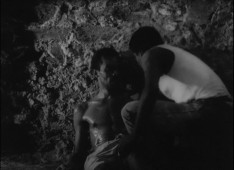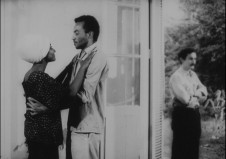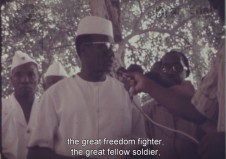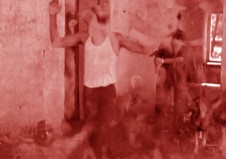Prismatic Ground: West Coast Showcase Program 1

Monangambee, by Sarah Maldoror
Los Angeles Filmforum and Rotations present
Prismatic Ground: West Coast Showcase
Sunday June 2, 2024, 1:00 pm - Program 1
At 2220 Arts + Archives, 2220 Beverly Blvd., Los Angeles CA 90057
In person: Inney Prakash, Suneil Sanzgiri
Tickets: $15 general, $10 students/seniors, free for Filmforum members
At https://link.dice.fm/xb13235a44a6
Buy a pass for the day for $30: https://link.dice.fm/Ud490800dcc9
Filmforum and Rotations are delighted to host curator Inney Prakash and multiple filmmakers for a showcase highlighting Prismatic Ground. Based in New York City, Prismatic Ground is centered on the best in contemporary and underseen classic cinema. This special west coast showcase features a selection of work by filmmakers featured in previous editions of the festival. From Palestine to India to Angola and Egypt— not to leave out the flowerbeds of Milwaukee— these artists address matters of personal grief, religious nationalism, settler-colonialism and capitalist excess with startlingly innovative and self-aware approaches to the moving image and its possibilities. www.prismaticground.com
Three different programs in one day at 2220, beautiful and powerful films demonstrating the breadth and depth of the curatorial vision of the festival, and bringing to Los Angeles some recent highlights of artist cinema, including Suneil Sanzgiri’s new film Two Refusals (Would We Recognize Ourselves Unbroken?). Please join us for the day.
There will be another program of Prismatic Ground: West Coast Showcase on Friday May 31 at Now Instant image Hall featuring the fantastic Barobar Jagtana trilogy by Suneil Sangiri, with Inney Prakash and Suneil Sanzgiri in person as well. https://now-instant.la/events/barobar-jagtana
Masks are highly recommended at Filmforum shows - N95 or KN95.
Inney Prakash is a film curator and critic based in New York City. He is the founder and artistic director of Prismatic Ground.
Suneil Sanzgiri is an artist, researcher, and filmmaker. Spanning experimental video and film, animations, essays, and installations, his work contends with questions of identity, heritage, culture, and diaspora in relation to structural violence and anticolonial struggles across the Global South. Sanzgiri’s films offer sonic and visual journeys through family history, local mythology, and colonial legacies of extraction in Goa, India—where his family originates. His first institutional solo exhibition Here the Earth Grows Gold opened at the Brooklyn Museum in October 2023. His films have circulate widely at film festivals and art institutions across the world including International Film Festival Rotterdam, New York Film Festival, Hong Kong International Film Festival, Camden International Film Festival, Sheffield Doc/Fest, Doclisboa, Viennale, BlackStar Film Festival, Open City Docs, REDCAT, Menil Collection, Block Museum, MASS MoCA, moCa Cleveland, Le Cinéma Club, Criterion Collection, and many more.
Los Angeles Filmforum is the city’s longest-running organization dedicated to weekly screenings of experimental film, documentaries, video art, and experimental animation. 2024 is our 49th year. www.lafilmforum.org
Rotations is an LA-based, occasional film series focused on experimental nonfiction filmmaking, artist and political cinema, and their detours, by living, transnational feminist practitioners and their collaborators.
----------------------
Los Angeles Filmforum screenings are supported by the Los Angeles County Board of Supervisors through the Los Angeles County Department of Arts & Culture, the Department of Cultural Affairs, City of Los Angeles. We also depend on our members, ticket buyers, and individual donors.

Monangambeee, by Sarah Maldoror
Monangambeee
By Sarah Maldoror
Algeria, 1968, b&w, sound, 18 mins.
Provided by Les Amis des Sarah Maldoror & Mario de Andrade
During a prison visit, a woman confides a promise to her husband, setting the stage for an unexpected chain of events. Tragically, a sentinel's misconstrued perception ignites a calamitous sequence, subjecting the couple to the harrowing ordeals of interrogation and torment. This narrative, cowritten by the filmmaker’s then-husband, Mário Pinto de Andrade, poignantly illustrates the consequences of a misread intention, unraveling lives through a cruel twist of fate, underscored by music from the influential Art Ensemble of Chicago.

The Return of Amílcar Cabral, (O regresso de Amílcar Cabral)
The Return of Amílcar Cabral, (O regresso de Amílcar Cabral)
By Djalma Fettermann, Flora Gomes, José Bolama, Josefina Crato, Sana na N'Hada,
Guinea-Bissau, Sweden, 1976, transfer to digital, color, sound, 32 min. Provided by Arsenal.
The first production by Guinean film-makers after the liberation from Portuguese colonialism in 1974, O Regresso de Amílcar Cabral documents the transferral of the remains of Amílcar Cabral from Conakry (where he was assassinated in January of 1973) to Bissau in 1976. An intriguing coverage of the solemn event, recordings of Guinean songs and archive footage of Cabral during the guerrilla war pay tribute to the political thinker and freedom fighter. (DocLisboa)

Two Refusals (Would We Recognize Ourselves Unbroken?), by Suneil Sanzgiri
Two Refusals (Would We Recognize Ourselves Unbroken?)
By Suneil Sanzgiri
India/USA, 2023, 16mm transfer to digital, color, sound, 35 min.
Two Refusals (Would We Recognize Ourselves Unbroken?) is an ongoing project focusing on interwoven narratives around the mutual struggle against Portuguese colonialism between India and Africa, and the bonds of solidarity that developed between the two continents. Told through a mix of interviews and fictional narratives, Two Refusals (Would We Recognize Ourselves Unbroken?) utilizes a blend of CGI animation, super 16mm film, hand-processed and destroyed archival film to uncover lost layers of world-building, kinship, and the material and immaterial network of relations that developed between historical figures in Goa, Mozambique, Angola, and Guinea-Bissau.
A woman’s dreams become haunted by a mythological titan from Portuguese mythology called the Adamastor—a giant storm cloud formed on the Cape of Good Hope who sought to destroy Vasco de Gama’s ship and prevent him from ever reaching India. Repurposed from Portugal’s oldest work of epic poetry, Os Lusíadas, the Adamastor becomes a figure of refusal but also of failure, as the woman who is haunted by the monstrous storm cloud’s presence in her nightmares recounts through monologues to the monster the ethno-nationalist violence taking hold in the aftermath of decolonization.
Read more about the film, and its material connections to the liberation of Palestine, here.
